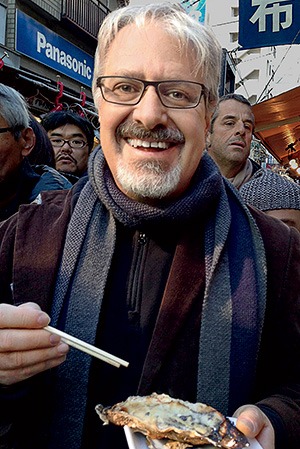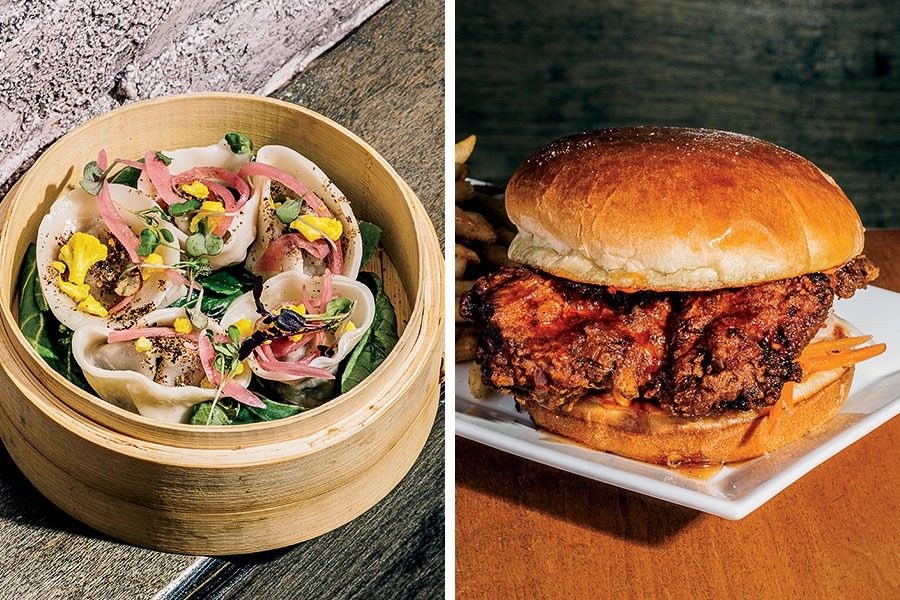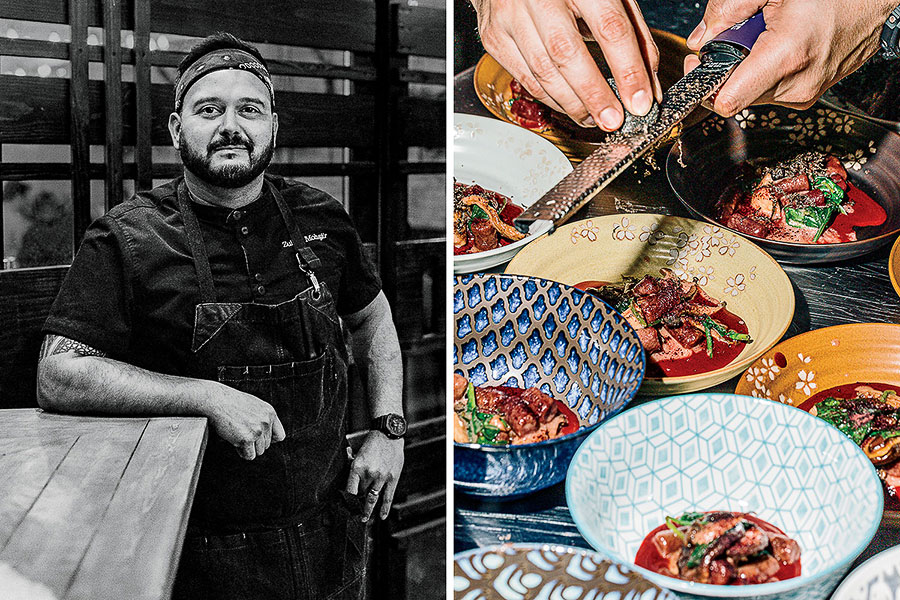
Editor’s Note: This is the first dining review we’ve posted in two years. It’s no coincidence this hiatus coincided with the pandemic. All the uncertainty in the industry — restaurants struggling to stay afloat, shifting their focus to takeout — made critical appraisal feel inapt. But now that things are stabilizing and places are opening (and reopening), we think diners can use help making sense of the new landscape.
Enter John Kessler. Our new critic brings a depth of food knowledge that is rare. He went to culinary school and worked as a cook and chef in Washington, D.C., and Denver before becoming a writer. Among other gigs, he served as the Atlanta Journal-Constitution’s dining critic for 18 years. Since moving to Chicago in 2015, he has regularly contributed to this magazine. (You may remember him as the guy who drew much ire for his 2018 essay, “The Party Is Over,” about how the local restaurant scene had lost its luster.)
“I go into each review as if I’m writing an email to a friend and describing an experience,” Kessler says of his approach to criticism. “It’s important to find that through line of honest appraisal.” He will use his reviews to assess restaurants in the larger context of the city’s dining industry and to start a dialogue with chefs. “Chefs parse reviews carefully, and in my experience they appreciate having an honest broker on the beat.”
—Terrance Noland, Editor in Chief
Whatever structure stood at 1742 West Division Street has been lost to time, replaced by the slender storefront that now occupies this address. But it must’ve been grand enough to have a sizable coach house out back. That back building, which predates the Great Chicago Fire, is where Zubair Mohajir has found a home for the Indian tasting-menu experience he started as a pop-up. Meanwhile, the storefront squeezes in tables for the pan-Asian street food he boxed for carryout through these last two difficult years.
Both places — the Coach House by Wazwan in back, Wazwan in front — show off the cuisine Mohajir synthesized from his life experiences: being taught to cook with his nose by his grandmother; training in fine-dining kitchens including Bangkok’s now-closed Gaggan, once the world’s top-rated modern Indian restaurant; doing research into the culinary history of South Asia; and having an international childhood that took him from Chennai, India, to Qatar, to Orland Park.
The Coach House, open for dinner Thursday through Saturday, offers an eight-course menu ($150). Here, Mohajir’s cooking flirts with brilliance. His sense of seasoning is impeccable, and many of his flavors have this great wait-for-it moment when they open up. But I find some of the courses a bit awkward, and they throw off the pacing of the meal. Also, the setting and service may not be transportive enough to justify the high price. That depends on your point of view. For me, this vital new restaurant is one to support and watch grow into its potential.
A meal at the Coach House begins with pure joy — a fresh-from-the-oven kulcha flatbread with a constellation of items to swipe it through. There’s an oozy chunk of honeycomb, a schmear of date-tamarind butter, and pickles both sharp and funky. Of all Mohajir’s life experiences, it’s Orland Park coming through here. He admits to basing this plate on a warm bread basket with whipped honey butter in a suburban family restaurant.
The meal also comes to quite the bang-up climax. There will be a fish course, perhaps an unctuous slab of black cod anointed with a Chettinad-style tomato chutney that zips and zings with all the warm spices. And then comes Mohajir’s magnum opus, duck Numidian. (What is Numidia? I’ll take “Ancient Kingdoms of Northwest Africa” for $200, Alex.) He found the outline of this recipe in a scholarly text and was intrigued by the components of the sauce, which combines leeks, dates, and pine nuts. He brings the sauce together with a balancing polarity of red wine vinegar and fish sauce and pairs it with a crisp-skinned leg of duck confit. It all tops a bed of khichdi made with black lentils and nutty matta red rice. This is that unicorn dish, equally intriguing and drop-dead delicious.
But if the endgame of this meal is like the rousing fourth movement of a symphony, the midsection feels pitchy and unsure of itself. Fish crudo in oolong tea broth is fun but so jazzed up with chiles and aromatics you can’t find that gardenia-like smell of the tea. A crab momo in a black garlic wrapper? Also fun, if you don’t search too hard for crab flavor. What to make of the beet fara? These rice cakes are like super-firm polenta, and they come in a glossy beet butter the color of fake blood from a ’60s slasher flick. You have to really like beets.
Mohajir delivers many of the dishes himself, so you find out a lot about their preparation and inspiration. He has a winning charm and drops f-bombs with such ease that you feel among friends. If you want to feel among service professionals, you might balk at your empty water glass or unwiped table. You might also find the room a bit cold if the weather doesn’t cooperate. On one visit, the kulcha arrived stuck to the plate by its nearly frozen butter schmear.
One last issue: Mohajir’s vegetarian menu (also $150) substitutes flora facsimiles for their protein counterparts. Instead of a scallop, you get a round of potato fondant. Instead of a duck leg, you get a leathery cluster of roasted mushrooms. I found the meal reasonably satisfying, but the high price demands more imagination and specialness.

In contrast with the Coach House, Wazwan is an easy date, lunch or dinner, weeknight or weekend. You can arrive with a six-pack and settle in for a great sandwich or a bowlful of yumminess and rice. Mushroom korma made with cashew butter, coconut milk, and various fungi both stewed and fried is pure decadence, vegan-style. Beef nihari momos with Sichuan peppercorn are hella spicy and sticky with meat juices. And that great Chettinad masala makes an appearance, here served with chicken and basmati rice. A special shout-out goes to Mohajir’s signature dish, the THC Sando. With its tandoori honey glaze, achara pickles, and gochujang aïoli, it sounds like a hot, gloppy mess for stoners. Instead, it’s the most carefully constructed and seasoned fried chicken sandwich in town.
Mohajir is so skilled at cooking meat, I’d love to see him attempt an actual wazwan — a Kashmiri feast comprising dozens of dishes, mostly meat. I almost regret that I’m just getting to know his work in today’s restaurant climate. Not that I don’t love a splashy tasting menu or a bomb sandwich, but I miss the days when chefs of his caliber opened places with small plates and noisy bars filled with overflow diners. Such restaurants rarely open anymore. They don’t make money, they can’t be staffed, they just don’t work.
So Mohajir is doing what he can, showing a lot of happy diners his unique perspective in the form of easygoing, everyday food at Wazwan. Meanwhile, those willing to splurge on Coach House will see just how much he is capable of.




